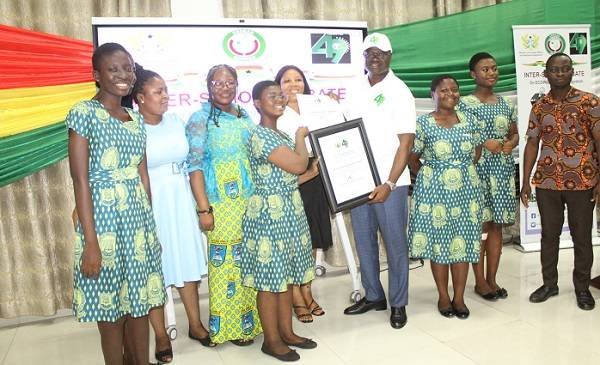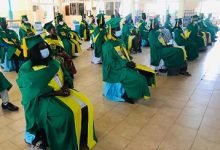
Accra Girls Senior High School (SHS) last Friday won a debate organised as part of the 49th Economic Community of West African States (ECOWAS) day celebration in Accra.
The team beat their counterparts from the Nungua SHS in the final debate during which the all-girls squad argued for the motion; Departure of Mali, Burkina Faso and Niger from ECOWAS will be more damaging to the three countries involved than to ECOWAS.
Based on their performance in the three proceeding debates, Presbyterian Boys SHS placed third followed by Achimota School, Christian Methodist SHS, and Lashibi Community Day SHS.
All participating schools won cash prizes, citations and certificates.
The ECOWAS Day is celebrated on May 28 every year to mark the establishment of the sub-regional bloc in 1975, with the signing of the ECOWAS treaty by heads of state and governments of 15 countries in West Africa, and a mission to promote economic integration.
This year’s celebration was on the theme “Enhancing Regional Peace, Unity and Security.”
In his welcome address, the ECOWAS Resident Representative in Ghana, Baba Wakil, underscored the importance of student debates in cultivating a global mindset and cross-border career prospects.
He noted the need to embrace digital transformation and emerging technologies like Artificial intelligence as they were critical for the region’s economic growth, security, and international competitiveness in areas such as cybersecurity.
The Representative urged schools to form ECOWAS digital clubs to engage with digital innovations that are reshaping various sectors globally.
Baba Wakil assured of ECOWAS’ continued backing for enthusiastic students while stressing digital transformation as key to the region’s future advancement and global competitiveness.
The Deputy Minister of Foreign Affairs and Regional Integration, Kwaku Ampratwum-Sarpong highlighted the significance of ECOWAS on its 49th anniversary, established to promote regional cooperation, integration, and an economic union in West Africa to raise living standards, maintain stability, foster relations among members, and contribute to Africa’s progress.
While acknowledging ECOWAS’s remarkable achievements in facilitating trade, free movement of people, promoting peace and security, he noted persisting challenges like economic disparities, civil unrest, democratic vulnerabilities, and infrastructure deficits amid a growing population.
He, therefore, emphasised the need to raise awareness and engage the region’s predominantly youthful population (65.per cent under 24) about ECOWAS’s mission, protocols, rights and opportunities. The debate was framed as a platform for youth to deepen understanding of regional integration, identify issues, and propose solutions, given their limited awareness of ECOWAS’s role in safeguarding their interests.
BY JONATHAN DONKOR







